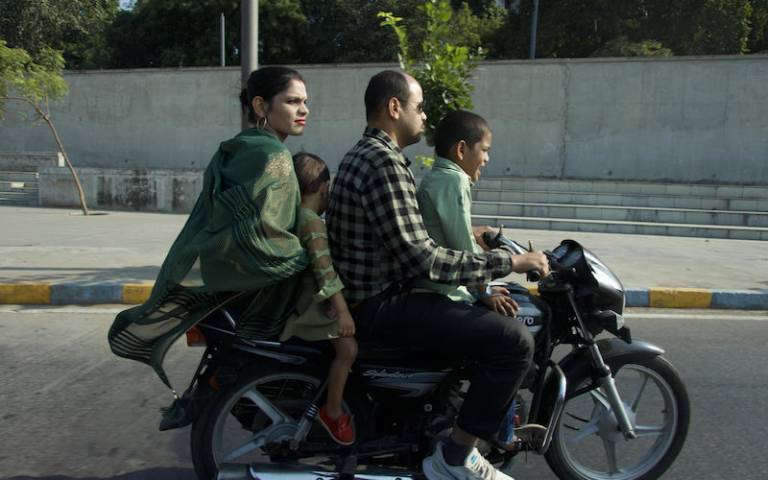Exploring saris, transport and gender through photography in Gujarat
Professor Liz Rideal (UCL Slade School of Fine Art) used Global Engagement Funds to create an image bank of women wearing saris in different contexts in Gujarat.

27 March 2023
The sari is a unique and feminine garment – carefully designed, specially woven and hand constructed every time it is worn. Many women can be seen wearing saris in India as they go about their everyday lives, and a number of women can be spotted wearing them on motorcycles and scooters. And although Western clothing is becoming more widely worn in India, saris are still prevalent.
To capture a record of the many contexts in which women wear saris in India, Professor Liz Rideal went to Gujarat, with the aim of photographing women in saris. With a particular interest in women wearing saris on motorcycles and scooters – and the insights into gender and independence this offered – she focused her work on the idea of saris and transport.
Witnessing independent women on scooters
“I conceived of this project when I was in Gujarat 12 years ago, because I was very struck by clothing that women were wearing on motorbikes,” Liz explained. “To my Western eyes, it seemed inappropriate. Not in terms of modesty, but in terms of practicality. It got me thinking, because much of my work over the years has involved either fabric or portraiture looking at clothing. This idea was a happy coming together of research strands.”
Liz was previously in India on a British Academy award, where she looked at cotton production and art, which resulted in a film being shown at the Whitworth Art Gallery. She went on to do a variety of other work and research, but recently returned to the idea of saris and transport in India. She applied for Global Engagement Funds, which enabled her to visit Gujarat for almost a month to explore the subject in depth.
The visit enabled her to take photographs of women wearing saris in a number of contexts, and resulted in some notable findings about gender and independence. “Taking the photographs made me realise that women don't ride motorbikes; certainly not in Gujarat anyway,” Liz said. “Men ride motorbikes, and women ride scooters. Women might sit behind the man riding a motorbike, and indeed some have sari guards.”
Noticing that many women were riding their own scooters, Liz realised that scooters are enabling women to be more independent. Scooters also enable them to wear traditional clothing if they want to. “If you ride a motorbike, you have to sit astride it. But if you drive a scooter, you can sit on it with your feet on a platform,” she explained. “I was trying to make a connection between the independence of women, public transport and personal transport. And I certainly think that the scooter frees people up.”
Liz also found that more women were wearing shalwar kameez or Western clothing since her last visit to India. Keen to explore how saris were being produced too, Liz visited some sari makers in Gujarat. "I watched women spinning cotton by hand, witnessed fabric being coloured in big dye baths, and saw patterns being printed onto sari material," said Liz. "It was exclusively men who were doing that colour work, which was also interesting"
Making connections with others
As well as creating this photographic record of women wearing saris in Gujarat, Liz took the opportunity to visit some other universities during her time there. She gave a lecture at the National Institute of Design in Gandhinagar to postgraduate photography students, and another lecture at The Maharaja Sayajirao University of Baroda, about the artist in relation to art history.
Since she has returned to the UK, Liz’s work has been displayed in the Slade's online exhibition called Colour/Print/Poetry, and she recently spoke at the Slade's Colour & Poetry Symposium on 21 March 2023. She is also exploring further funding options to create a publication to collate the photography from her Gujarat trip.
 Close
Close

